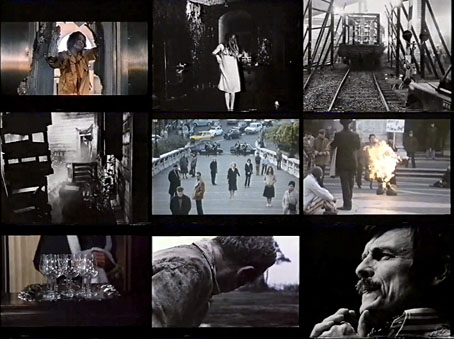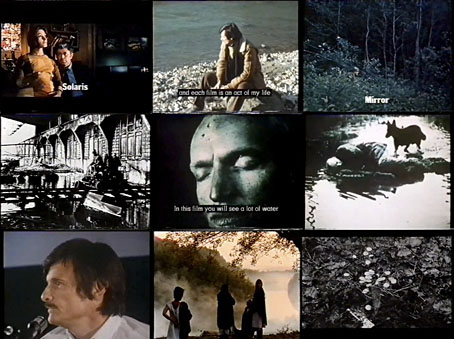More slow cinema. The Antonioni documentary was broadcast by the BBC in their regular Arena arts strand, as was this 50-minute profile from 1987. Andrei Tarkovsky is a favourite Arena of mine, one I’ve watched many times over the years, whether original broadcast, VHS tape or digitised copy. As with the Antonioni film it’s one of many such episodes which functions as an ideal introduction to its subject.
1986 was the year of Tarkovsky’s untimely death so Charlie Pattinson’s documentary served as a memorial as well as a celebration of a director whose reputation had been growing throughout the decade. I love the way this one starts cold with a series of clips from all seven of the feature films; no comment required. Further clips follow but the real value is in the extracts from interviews and talks given by the director which punctuate the biographical chronology. The first of these is a declaration of Tarkovsky’s belief that film-making is a unique medium in its ability to capture and assemble temporal moments, something he explored in depth in his book, Sculpting in Time. In his talks and his writings he can often seem overly serious when discussing his work, especially in a world where film-making is largely regarded as merely another division of the entertainment industry. But he regarded both art and film-making as serious affairs, and many of his films required considerable effort to be made at all. Hollywood has long been notorious for confounding the endeavours of maverick directors but the apparatchiks at Goskino were seldom better, continually rejecting new proposals or interfering with the films after they were made. Tarkovsky’s diaries are filled with accounts of his struggles with the bureaucrats who oversaw film production. When he wasn’t fighting censorship attempts or refusals to release a new film, he was dealing with other refusals to approve his projects altogether. We’re fortunate that Stalker exists at all when most of the exterior footage needed to be reshot after the negative was ruined by incompetent processing. This calamity wasn’t the director’s fault but Goskino were reluctant at first to let him finish the film. These constant struggles eventually compelled him to leave the Soviet Union in order to make films elsewhere, a painful decision which is discussed in the final part of Pattinson’s documentary by the director’s wife and production assistant, Larisa. The pair were allowed to leave the country but they were also forced to do so without their young son, a typically cruel and petty punishment by the Soviet authorities.
In the Antonioni post I mentioned that Tarkovsky’s present popularity is sustained by Solaris and Stalker much more than by his other films. People who only know the director from his excursions into science fiction may be surprised to hear him dismiss Solaris as his least successful feature on a personal level. Documentaries such as this may encourage some of those viewers to explore the rest of his filmography.
Previously on { feuilleton }
• Zone music
• Sine Fiction
• Rerberg and Tarkovsky: The Reverse Side Of “Stalker”
• The Stalker meme


